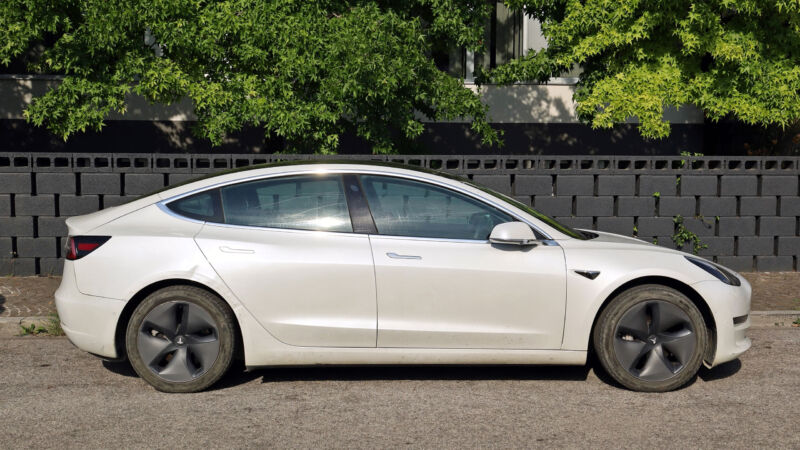
Getty Images
The launch of a new electric vehicle these days is invariably met with a chorus of “this car is too expensive”—and rightfully so. But for used EVs, it’s quite another story, particularly used Teslas, thanks to a glut of former fleet and rental cars that are now ready for their second owner.
“Due to a variety of reasons, Tesla resale values have plummeted, making many Tesla models very affordable now. Plus, for some consumers, an additional $4,000 Federal tax credit on used EVs may apply, sweetening the deal even further. Buying a used Tesla can be a great deal for the savvy shopper, but there are significant things to look out for,” says Ed Kim, president and chief analyst at AutoPacific.
Indeed, a quick search on the topic easily reveals some horror stories of ex-rental Teslas, so here are some things to consider if you’re in search of a cheap Model 3 or Model Y.
For more than a year, Tesla has been engaged in an EV price war, mostly driven by its attempt to maintain sales in China. Heavily cutting the price of your new cars is a good way to devalue the used ones, and Hertz’s decision to sell at least 20,000 of its Teslas was in part a response to the lower residual values.
What to watch for
“The prices are very appealing, but shoppers must keep in mind that rental cars can and do get abused, and some of these ex-rental units may have nasty surprises stemming from their hard lives. Be sure to have yours checked out thoroughly by a mechanic before buying,” Kim says.
Mismatched tires and minor dents, scrapes, and rock chips are fairly common minor issues. Many of the Teslas that Hertz is selling have been used as Ubers—you can tell it’s one of these if the odometer is approaching 100,000 miles. Battery degradation could be an issue, although most cars will not have lost more than 4–5 percent capacity, and Long Range Teslas should have a powertrain warranty for up to 120,000 miles (or eight years).
“One side effect of Tesla’s widespread and reliable DC fast charging network is that many owners end up relying on it to keep their cars charged rather than dealing with the often considerable expense of installing a home charger and associated home electrical upgrades,” Kim told Ars. As such, you should make sure to check the battery’s health (which can be done on the touchscreen or as part of the inspection) before you buy.
Rental cars can suffer from an excess of slammed doors and trunks—slamming the latter can mess up the powered strut. In the interior, you should expect high signs of wear on some touchpoints, especially the steering wheel and the rear door cards, which can bubble or flake, particularly if the Tesla was used as a ridehailing vehicle.
Other potential headaches
Teslas are very connected cars, and many of their convenience features are accessed via smartphone apps. But that requires that Tesla’s database shows you as the car’s owner, and there are plenty of reports online that transferring ownership from Hertz can take time.
Unfortunately, this also leaves the car stuck in Chill driving mode (which restricts power, acceleration, and top speed) and places some car settings outside of the new owner’s level of access. You also won’t be able to use Tesla Superchargers while the car still shows up as belonging to Hertz. Based on forum reports, contacting Tesla directly is the way to resolve this, but it can take several days to process; longer if there’s a paperwork mismatch.
Once you’ve transferred ownership to Tesla’s satisfaction, it’s time to do a software reset on the car to remove the fleet version.
Not every car will qualify for the $4,000 IRS used clean vehicle tax credit. It has to be at least two model years older than the calendar year in which it is bought used, so only MY2022 and earlier EVs are currently eligible, and it can’t be offered for sale for more than $25,000. The income caps are also half as much as the new clean vehicle tax credit, meaning a single-filing individual can’t earn more than $75,000 a year to qualify.
There are plenty of complaints among the Tesla community that Hertz wasn’t set up to deal with the tax credit, although more recent buyers have reported this has gotten a lot smoother. It’s worth planning ahead and contacting the specific sales branch you plan to buy the Tesla from to make sure they are able to process that paperwork, particularly if you are expecting the credit to be applied to the car’s price at the point of sale rather than waiting until you file your taxes next year.
Buying an ex-rental or ex-fleet Tesla from an independent dealer is also an option. Lots of used car lots have bought Teslas at auction from Hertz and elsewhere, and online anecdotes suggest this is often a more painless experience, particularly when transferring ownership and registering the new owner with Tesla. Then again, you’re more likely to encounter useless third-party warranties and the like if you go this route.
Ex-rental or fleet cars may have had a hard life, but they are also usually maintained far more regularly than most privately owned vehicles. As long as you make sure you aren’t buying a lemon, it’s a good way to get an EV for less than $20,000.
